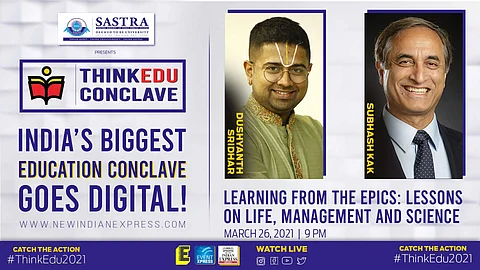

Indian universities need an ecosystem for critical examination of thought which will help study ancient Indian texts and theories better, said Indian-American computer scientist Dr Subhash Kak. He was speaking at The New Indian Express' ThinkEdu Conclave 2021. Dr Kak discussed the role of the epics and the science behind them with Indic scholar Dushyanth Sridhar and senior journalist Kaveree Bamzai on Day 1 of the conclave.
Dr Kak said that Indian universities would probably not take up a management course that takes its inspiration from the Bhagavad Gita. "The ecosystem that we need for critical examination of thought does not exist to the degree it should. There are a lot of outstanding people in Indian universities but, by and large, there is a desire to be validated by the West — which is good because we are all in the same global village. A few years ago, there were courses at Columbia University and other leading American universities on management through the Bhagavad Gita. I would imagine that such a thing will never be done in an Indian university," said Dr Kak.
But it's not just about science. The epics themselves are more detailed and lively than whatever we have probably read, added Sridhar. "The very art of storytelling of all our scriptures, be it the Ramayana or the Mahabharata, gave me the opportunity to draw a beautiful canvas in front of me. For instance, the Mahabharata has 14 times the number of characters than the seven-volume Harry Potter," said Sridhar, adding that the multitude of characters and the variety of emotion is there in these books because India was an advanced civilisation in those days. "The Ramayana is the most important and the first of the works that we research and delineate upon — I have been doing that for the past ten years. Now, every time I take the Ramayana and compare it with the seven commentaries by the ancient ones, I understand that whatever I have known on the Ramayana is very little. Every night, every moment I read through the Ramayana, it gives me that feeling that 'I have been studying this book for the past nine years and I haven't come across this point, why did I miss it?'. Be it the Ramayana or the Mahabharata, every shloka has been delineated by the commentators so beautifully that you always have the feeling that you should go back to the books. Generally, that does not happen — if you take an Enid Blyton novel, for example, if you read a novel you wouldn't want to read it again," he added.
Talking about his inspiration to start digging into ancient Indian science, Dr Kak said, "In the mid-eighties, I was working on Artificial Intelligence and I remembered something my father told me when I was a little kid. He used to tell me about Pāṇini's grammar, which represented Sanskrit completely in 4,000 algebraic rules. Scholars, now, believe it to be equivalent to the most powerful programming language. This set me going. I thought that this didn't quite gel with the accounts of Indian science one reads in books, so I decided to investigate on my own and I went back through various layers of Sanskrit literature. I discovered a lot of subjects, including astronomy, that have been lost for a couple of thousand years. I wrote papers and books on them and it opened a whole new horizon to me."
India needs to move away from the Western gaze, said Dr Kak and added, "I realised that the last 80 years have been quite problematic in India. We are teaching Indians through the Western gaze. It is ironic that the elite still arrange for their children to learn about these things privately but they don't want it to be a part of the curriculum. It's been an interesting struggle because there are those who denounce this as if it's something regressive. It isn't. In the West as well, people are enormously attracted to all these ideas because ultimately, the very heart of Indian tradition is the mystery of consciousness. The Vedas are supposed to be Atma Vidya, which is the signs of consciousness, which is the frontier of science as it is," he said.
Sridhar, whose lectures are popular on YouTube, said that he often gets questions from researchers about the relatability of the epics to science. "Students who are studying AI and nanotechnology have asked me, 'Could this in the Ramayana have relation to AI' or 'If this in the Mahabharata has a relationship too'. More than checking if there is a relationship, there is the thought that this could be related. The thought process itself is very refreshing and good," he said. "If we say that we want to bring in some aspects from the epics into the syllabus, there will be controversies," he said and added that Aryabhatta had introduced the concept of Pi in casual conversation. "I don't think the future generation would be mocking (us) if we introduced these into the curriculum. We all believe in the concept of written papers. Our system has been very oral. Just because a lot of things have not been documented the way the West wants them, it does not mean that science did not exist. So, probably today, as Indian citizens who are proud of the civilisation, we should get into documenting it the way the West wants it. Not to impress them but to tell them to correct the notion that they have about the country," he added.
